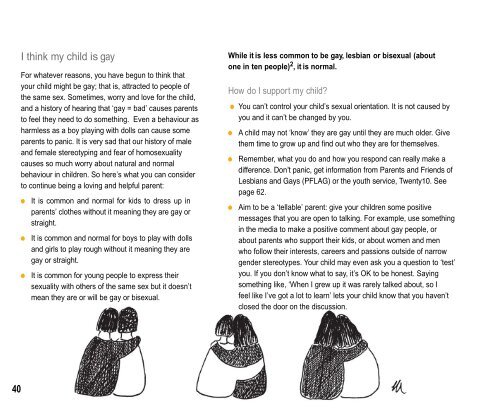Talk Soon Talk Often book 2014 FLIP
You also want an ePaper? Increase the reach of your titles
YUMPU automatically turns print PDFs into web optimized ePapers that Google loves.
I think my child is gay<br />
For whatever reasons, you have begun to think that<br />
your child might be gay; that is, attracted to people of<br />
the same sex. Sometimes, worry and love for the child,<br />
and a history of hearing that ‘gay = bad’ causes parents<br />
to feel they need to do something. Even a behaviour as<br />
harmless as a boy playing with dolls can cause some<br />
parents to panic. It is very sad that our history of male<br />
and female stereotyping and fear of homosexuality<br />
causes so much worry about natural and normal<br />
behaviour in children. So here’s what you can consider<br />
to continue being a loving and helpful parent:<br />
It is common and normal for kids to dress up in<br />
parents’ clothes without it meaning they are gay or<br />
straight.<br />
It is common and normal for boys to play with dolls<br />
and girls to play rough without it meaning they are<br />
gay or straight.<br />
It is common for young people to express their<br />
sexuality with others of the same sex but it doesn’t<br />
mean they are or will be gay or bisexual.<br />
While it is less common to be gay, lesbian or bisexual (about<br />
one in ten people) 2 , it is normal.<br />
How do I suppor t my child?<br />
You can’t control your child’s sexual orientation. It is not caused by<br />
you and it can’t be changed by you.<br />
A child may not ‘know’ they are gay until they are much older. Give<br />
them time to grow up and find out who they are for themselves.<br />
Remember, what you do and how you respond can really make a<br />
difference. Don’t panic, get information from Parents and Friends of<br />
Lesbians and Gays (PFLAG) or the youth service, Twenty10. See<br />
page 62.<br />
Aim to be a ‘tellable’ parent: give your children some positive<br />
messages that you are open to talking. For example, use something<br />
in the media to make a positive comment about gay people, or<br />
about parents who support their kids, or about women and men<br />
who follow their interests, careers and passions outside of narrow<br />
gender stereotypes. Your child may even ask you a question to ‘test’<br />
you. If you don’t know what to say, it’s OK to be honest. Saying<br />
something like, ‘When I grew up it was rarely talked about, so I<br />
feel like I’ve got a lot to learn’ lets your child know that you haven’t<br />
closed the door on the discussion.<br />
40


